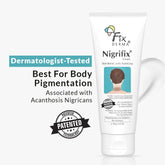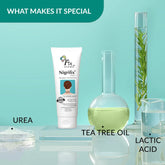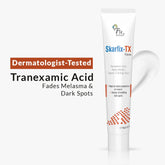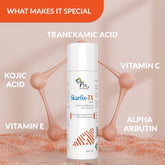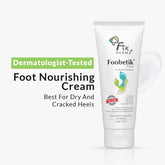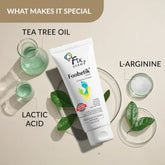Things You Must Know Before Choosing The Best Sunscreen for Acne-Prone Skin

Table of Content
- Why Sunscreen is Non-Negotiable For Acne-Prone Skin
- The Myth That Sunscreen Causes Breakouts
- What to Look For in the Best Sunscreen for Acne-Prone Skin
- Best Dermatologists Recommended Sunscreens For Acne Prone Skin
- How to Layer Sunscreen with Your Acne Skincare Products
- Conclusion
- Frequently Asked Questions
If you have got acne-prone skin, sunscreen is either something you avoid or something you dread applying on your skin. One wrong formula and suddenly your face feels greasy, your pores feel heavy or unexpected breakouts after sun exposure, sound all too familiar. It’s frustrating but skipping SPF altogether is not a solution. In fact, it is one of the most important steps in your skincare routine for acne-prone skin.
Whether your skin is dealing with active breakouts or stubborn post-acne marks, daily sun protection is the key to preventing pigmentation, inflammation, and long-term skin damage. But not all sunscreens are created equal especially if your skin is sensitive or oily.
Let’s take a look at all you need to know before picking the best sunscreen for acne-prone skin, along with some dermatologist-recommended sunscreens that are specially designed for acne-safe protection.

Why Sunscreen Is Non-Negotiable for Acne-Prone Skin
People usually believe that if their skin is oily they do not need sunscreen. So, do you really need sunscreen? The answer is yes, especially if you’re using acne treatments like salicylic acid, benzoyl peroxide, retinoids, or AHAs. These ingredients make your skin even more sensitive to sun damage.
What Happens Without Sunscreen?
- Acne marks and pigmentation darken
- UV rays increase inflammation
- Skin aging speeds up
- Skin barrier gets weak, making your skin more acne-prone and sensitive
Using a broad-spectrum sunscreen for acne-prone skin not only protects from UVA and UVB rays but also helps in acne scar healing, reduces redness, and maintains an even skin tone.

The Myth That Sunscreen Causes Breakouts
One of the common concerns of people with acne prone skin is that “Every time I apply sunscreen, I break out.” But more often than not, it’s not the SPF causing acne it’s the formulation.
Why Some Sunscreens Break You Out:
- Occlusive or thick textures trap sweat, dirt, and oil
- Comedogenic ingredients block pores
- You’re not double cleansing to remove SPF properly
- You reapply over a sweaty face without cleansing
How to prevent sunscreen-related breakouts:
- Always cleanse thoroughly at night (use a gentle acne face wash)
- Reapply on clean skin after every 2-3 hours when outdoors.
- Opt for light, breathable formulas like Fixderma Shadow SPF Gel
Sunscreens that feel like moisturizers are better tolerated, especially when paired with a serum for acne scars or an anti acne serum underneath.

What to Look For in the Best Sunscreen for Acne-Prone Skin
If you’ve ever skipped sunscreen because it felt too greasy, made your skin look shiny, or worse broke you out. You are not alone, we get how picking the wrong sunscreen can quickly undo all the progress your skin has made with your treatments. But not wearing sunscreen is not the solution as it can leave your skin vulnerable to sun damage, dark spots, and worsened acne scars for life.
So how do you choose the right one for your skin? Here are top 4 things to look for in your sunscreen:
- Non-comedogenic that won’t clog pores or trigger acne breakouts
- Oil-free or gel-based texture of sunscreen that feels breathable
- Broad-spectrum SPF 30 or higher to block the harmful UVA and UVB rays
- Lightweight, fast-absorbing texture that doesn’t leave a white cast
Sunscreen doesn’t have to be heavy, pore-clogging, or irritating. With the right ingredients and texture, it can be your skin’s best defense without triggering a breakout. Let us take a look on some of dermatologists recommendations when it comes to finding the best sunscreen for acne prone skin.

Best Dermatologists Recommended Sunscreens For Acne Prone Skin
When in doubt, choose products recommended by skin professionals. Fixderma’s Shadow range is known for being acne-safe, trusted by over 15000 dermatologists to be oil-free and non-comedogenic, making it an ideal choice for people with sensitive and acne-prone skin.
Fixderma Shadow SPF 50+ Gel
Shadow SPF 50+ Gel Sunscreen is a lightweight, non-comedogenic, sunscreen that protects your skin from harmful UV rays and leaves no white cast. It is one of the best sunscreens for oily acne prone skin and works well with serums, moisturizers in the humid-weather.
Fixderma Shadow SPF 30+ Gel
Fixderma Shadow SPF 30+ Gel Sunscreen that provides reliable protection while still being gentle on breakout-prone skin. The SPF 30+ Gel works best for indoor protection and does not feel heavy on the skin.
Bonus tip: Pair this with a salicylic acid face wash for acne and a moisturizer for acne prone skin to create a well-rounded routine.
Fixderma Shadow A-Gel SPF 30+ Sunscreen
This lightweight, non-comedogenic gel sunscreen offers broad-spectrum protection without clogging pores or leaving a greasy finish. Perfect for oily, acne-prone skin, it comes in the variation of SPF 50+ to protect your skin effectively even when outdoors.
Fixderma Shadow Pore Minimizing SPF 50+ Sunscreen
Formulated with SPF 50+ and skin-refining ingredients like niacinamide, this sunscreen shields against UV rays and helps to reduce open, enlarged pores. Ideal for humid weather, it gives an even skin texture all day.
Try Fixderma Shadow Sunscreen Range for acne prone skin

How to Layer Sunscreen with Your Acne Skincare Products
You don’t need to give up your acne treatments to wear SPF. In fact, they work better with sunscreen. Here’s how to layer your routine properly:
A simple skincare routine for acne-prone skin:
Step 1 - Cleanse: A salicylic acid face wash for acne to remove dirt, oil and impurities
Step 2 - Treat: Apply your skin with an acne defence face serum or serum for acne and scars
Step 3 - Hydrate: Opt for a non-comedogenic, moisturizer to hydrate your skin effectively
Step 4 - Protect: Finish with a broad-spectrum sunscreen like Fixderma Shadow SPF 50+ Gel
Give each layer a few minutes to absorb before moving on to the next. If wearing makeup, opt for oil-free, non-comedogenic products. Bonus Tip: Even indoors or on cloudy days, UV rays can damage your skin. Make SPF your everyday essential.
Read this blog to learn more on a simple skincare routine for acne prone skin How to Build an Acne-Safe Skincare Routine (Dermatologists-Approved Guide)
Conclusion
Finding the best sunscreen for your acne-prone skin does not have to feel like a quest. Once you understand your skin’s needs and the ingredients to look for, it becomes easier to make smart, skin-safe choices. Fixderma’s Shadow Sunscreen Range checks every box of sunscreen needs for every skin, especially acne-prone skin as it’s lightweight, non-comedogenic, high in protection, and suitable for Indian weather.
You do not have to settle for sunscreen that either clog your pores or leave your skin unprotected. The right one does both. Stick to a simple routine that feels good in your skin and make SPF an everyday step in your skincare routine. It’s one of the simplest ways to keep your skin healthy and clear.
Frequently asked Questions
-
What is the best type of sunscreen for acne-prone and oily skin?
The best sunscreen for acne-prone and oily skin is a lightweight, oil-free, non-comedogenic formula preferably gel-based. Fixderma Shadow Sunscreen with SPF 30 or higher ensures broad-spectrum protection without clogging pores or causing breakouts.
-
Can sunscreen cause breakouts or acne?
Yes, certain sunscreens can trigger breakouts if they contain comedogenic (pore-clogging) ingredients or are too heavy for your skin type. To avoid this, choose sunscreens that are specifically formulated for acne-prone skin with a non-comedogenic label.
-
Is it safe to use sunscreen daily on acne-prone skin?
Absolutely. In fact, it’s highly recommended. Daily use of a suitable sunscreen helps prevent acne scars from darkening and protects your skin from UV-induced irritation and inflammation. Choose a gentle SPF 30 sunscreen that works well with your acne treatments.
-
What ingredients should I avoid in sunscreen for acne-prone skin?
Avoid sunscreens with heavy oils, artificial fragrances, alcohol, and comedogenic agents like lanolin or coconut oil. These can clog pores and worsen breakouts. Instead, opt for clean, minimal-ingredient formulas made for sensitive skin.
-
What makes Fixderma sunscreens better than regular SPF products for acne-prone skin?
Fixderma sunscreens are lightweight, sweat-resistant, non-comedogenic, and free from pore-clogging ingredients. Unlike many traditional sunscreens, they’re specifically formulated to protect acne-prone and oily skin without worsening breakouts or shine.
